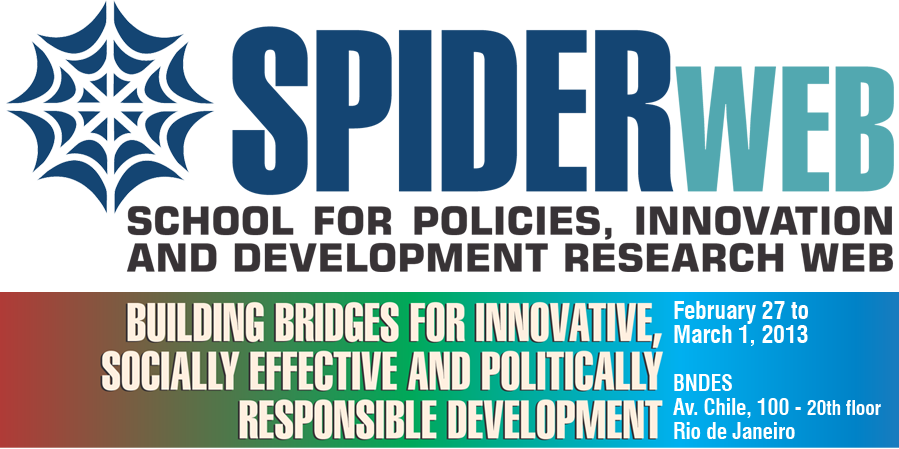Day 2 – February 28
9h30 – 13h15 – Session 3
Knowledge, Knowledge Governance and Innovation
The notion that catching up processes at the national level are a guarantee and/or the inevitable path to the development of emerging countries must be revised. Not only because of the growing complexity of technology management in a global arena, and because the Chinese experience is posing questions to the very notion of catching up. Middle-income countries, such as Brazil, Argentina, Malaysia and India, among many others, face the permanent risk of being caught in legal shackles and technological strategy traps, losing a better position in the competitive landscape. Some new questions must be asked: what are the “legal traps” for knowledge diffusion hidden in international treaties and agreements? What is, after all, a technological frontier, who defines it, and how? In this realm, the nexus between law and economics, the nature of technological competition, required organizational capabilities to produce and manage innovation, intellectual property rights, sustainability and the governance of knowledge are at the center of the debate.
Chair: Mario Possas (Institute of Economics, UFRJ) *
09h30 – 10h20 – Introducing themes and proposals for the debate
Mariana Mazzucato (SPRU, England) *
Giovanni Dosi (Sant´Anna School of Economics, Italy) *
10h20 – 11h05 – Comments
Glauco Arbix (President, Finep)
Chen Ling (Tsinghua University) *
Benjamin Coriat (Université de Paris XIII) *
Leonardo Burlamaqui (Ford Foundation and State University of Rio de Janeiro) *
11h05 – 11h20 – Coffee break
11h20 – 13h15 – Round Table
Chair: Fernanda De Negri (IPEA) *
Adriano Proença *
Ana Célia Castro*
Anna Jaguaribe *
Annalisa Primi *
Beatriz Amoring Borher *
Biancca Scarpeline Castro *
Caetano Penna *
Cristina Possas*
Denis Barbosa *
Domício Proença *
Flávia Campos Kickinger *
Helena Tenório Veiga de Almeida *
Joana Serra da Luz Mendonça *
João Carlos Ferraz *
João Paulo C. de Holanda Braga *
José Eduardo Cassiolato *
Ligia Inhan *
Liliana Acero *
Luiz Martins de Mello *
Manuel Heitor *
Márcio Wohlers *
Mário Ripper *
Maurício dos Santos Neves *
Nivalde Castro *
Paulo Furquim de Azevedo *
Paulo Bastros Tigre *
Renata La Rovere *
Ronaldo Fiani *
Sylvia Saes *
Valéria Delgado Bastos *
Victor Prochnik *
13h15 – 14h45 Lunch
14h45 – 16h45 – Session 4
Building a School for Advanced Studies: Cases and Experiences
14h45 – 15h45 – Presentations
Débora Foguel (Federal University of Rio de Janeiro)*
Manuel Heitor (IN+, Universidade Técnica de Lisboa, Portugal) *
Francisco Saggasti (Forum Peru) *
Marina Szapiro (UFRJ, Globelics, Redesist, Brazil) *
15h45 – 16h45 – RoundTable
Ana Célia Castro *
Andreas Nölke *
Beatriz Amoring Borher *
Cristina Possas *
Emily Jones *
Benjamin Coriat *
Gary Dymski *
Giovanni Dosi *
Joana Serra da Luz Mendonça*
José Miguel Busquets *
Lionelllo Punzo *
Luiz Bevilacqua *
Paulo Furquim de Azevedo *
Peter May *
Rainer Kattel *
Silvana De Paula *
16h45 – 17h00 – Coffee break
17h00 – 19h00 – Session 5
Building a School for Advanced Studies: Structuring Research Projects
17h00 – 18h00 – Presentations
Annalisa Prim i(OECD, France) *
Barry Naughton (University of California, USA) *
Luiz Bevilacqua (UFRJ, Brazil) *Round table:
Chair: Segen Farid Estefen (COPPE, UFRJ, Brazil)
Alexandre Gomide *
Carlos Morel *
Caetano Penna *
Chen Ling *
Cristina Possas *
Edmar de Almeida *
Fernanda De Negri *
Lionello Punzo *
Luiz Fernando de Paula *
Mariana Mazzucato *
Moira Paz Estenssoro *
Renato Boschi *
Sebastian Płóciennik*
(* Confirmed)






